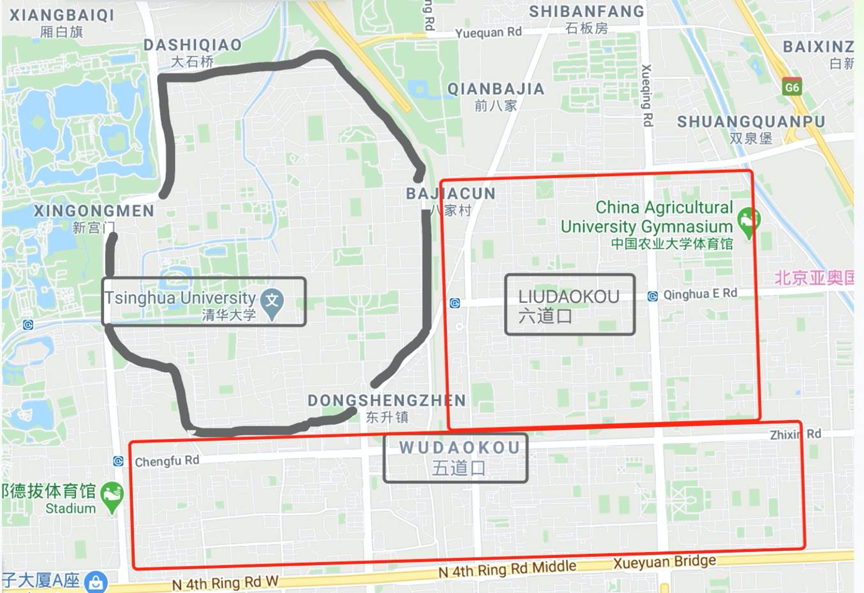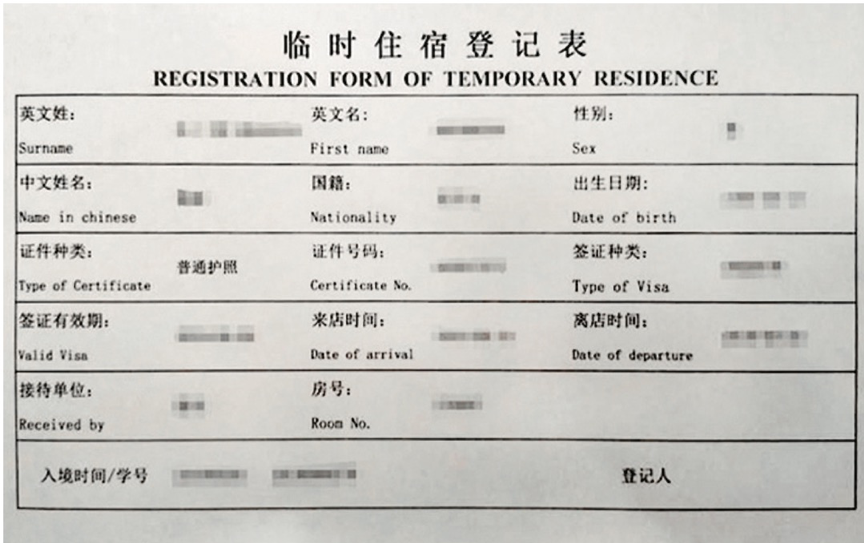Location: Home > Life at Tsinghua > Accommodation > Off-campus accommodation
Due to limited amount of accommodation available on campus, some students will need to live off-campus. Below is a guide on how to find rental accommodation off-campus and some important tips to remember whilst renting.
I. Process for finding and securing rental accommodation in Beijing
Due to limited amount of accommodation available on campus, some students will need to live off-campus. Below is a guide on how to find rental accommodation off-campus and some important tips to remember whilst renting.
Notes:
Always keep copies of all payments and the contract.
Always sign a contract. Without a contract you have no legal rights.
For students who will live with family or friends in private residences, they still need to complete steps 7 and 8.
Step 1: Research accommodation online via reputable rental agencies
Before arriving in China, begin researching off-campus accommodation options. To ensure your rights and safety, it is recommended that you only rent through reliable and official agencies that have standardized procedures and regulations. According to national law, foreigners residing in China must register their accommodation at the local police office. Individual landlords may not be willing or able to help you register and therefore renting through established rental agencies is highly recommended.
Below are three main rental agencies in China. Before your arrival, you can first access their websites to learn of their accommodation options. Then once in China, you can go to their neighborhood shopfronts to request to view properties.
Ziroom:
Website:http://www.ziroom.com
Ziroom is a popular choice for foreigners renting in Beijing. They have an easy-to-use app that also has an English interface for searching for accommodation. Once securing accommodation via Ziroom, on the app you can find the details of your accommodation, including the contract and details on your payments made. Included in the contract is a service fee, which includes regular cleaning of the public spaces of the apartment, and also easy servicing for repairs. You will also be advised to add your agent on WeChat for ease of contact.

Image: QR code of Ziroom app
Lianjia:
Website:https://bj.lianjia.com/zufang/
5i5j:
Website:https://bj.5i5j.com/zufang/
Note: The International Students & Scholars Center is not able to specifically recommend or choose off-campus rental accommodation or agencies for students. It is suggested that students only secure a rental place once they have arrived in China and have compared and toured various rental properties. Students can first book temporary accommodation in a hotel or hostel to give them time to visit and compare rental accommodation.
Step 2. Establish your rental accommodation budget and other preferences including location
1) Budget:
Rent price point references for accommodation near Tsinghua
Private apartment (one bedroom): 5,000-8,000 yuan/month
Whole rent (two-bedroom): 7,000-10,000 yuan/month
Whole rent (three-bedroom): 8,000-20,000 yuan/month
Whole apartment (four bedrooms or more): 30,000 yuan/month
Shared rent (two-bedroom): 3,000-5,000 yuan/room/ month
Shared rent (three-bedroom): 2000-4500 yuan/room/ month
Shared rent (four-bedroom): 2000-4000 yuan/room/ month
2) Where to rent:
Due to its close proximity to Tsinghua University, many students living off campus choose to live in apartment blocks located in the Wudaokou and Liudaokou areas.
 Image: Neighborhoods around Tsinghua University
Image: Neighborhoods around Tsinghua University
Wudaokou (五道口):
The Wudaokou area is a student-hub, as it is located near several universities including Tsinghua. It has an international atmosphere and is filled with shops, restaurants, coffee shops and bars. The main department store in Wudaokou, known as the U-Center, is home to clothing and lifestyle stores, a pharmacy and the BHG supermarket on the basement floor housing many international products. Nearby, there is also D-Mart - a smaller international supermarket, and Lotus supermarket - a large local supermarket chain. The busiest and most bustling part of Wudaokou is centered on either side of the Wudaokou subway station of Line 13. Nearby the Wudaokou subway station are bus stops that can take you to the northeast gate of Tsinghua University (bus number 549) and several buses going in the direction of nearby Peking University and Zhongguancun, Beijing’s technology hub.
Students residing in Wudaokou generally travel to Tsinghua either via the bus, cycle or electric scooter. The bus trip takes approximately 5 minutes when there is little traffic but varies due to heavy congestion during peak hours. Riding a bicycle is the most convenient and time-efficient option as it does not depend on the traffic and you can ride straight to your destination in Tsinghua. From the Wudaokou subway station to the teaching buildings area on campus it takes approximately 15 minutes by bicycle.
Liudaokou (六道口):
Quieter and less crowded than Wudaokou is the area of Liudaokou. It is located close to campus and has its own subway station of the same name on line 15, as well Qinghua Donglu Xikou - an even closer subway stop to campus. Liudaokou has malls and a large variety of Chinese restaurants.
Students living in Liudaokou generally travel to Tsinghua either via bicycle or electric scooter. From the Liudaokou subway station to the teaching buildings area on campus it takes approximately 20 minutes by bicycle.
Other neighbourhoods:
Because of their convenience and locality, rental fees in Wudaokou and Liudaokou are more expensive than many other residential areas of Beijing. Students who are looking for cheaper or larger rental apartments can look to neighboring areas, such as in the Xierqi area (西二旗) or Changping district (昌平区). There, students can travel nearby subway stops to Tsinghua, then rent one of the many share bicycles found at subway entrances to travel into campus. However, during peak hours the subways are very crowded and therefore, so as to not influence one’s studies and participation in campus life, it is recommended that students take into account the impact of their commuting time before securing a rental property.
Step 3. Book temporary accommodation for your arrival in Beijing
Before arriving in Beijing, book temporary accommodation to give you time to inspect rental properties. Below are some hotels located near to the Tsinghua campus.
Beijing Wenjin International Hotel
Tsinghua Science and Technology Park, Haidian District
+86-10-62525566
Holiday Inn Beijing Haidian
No. 89, Shuangqing Road, Haidian District
+86-10-82398888
Beijing Lanting Hui Express Hotel
No. 35 Chengfu Road, Haidian District
+86-10-62619296
For more hotels or hostels, search areas in Beijing such as ‘Wudaokou’ or ‘Liudaokou’ on using commonly used booking sites such as:
www.trip.com/or www.booking.com
Reminder:
According to Chinese Government regulations, foreigners in China must obtain a Registration Form of Temporary Residence (临时住宿登记表) within 24 hours of their arrival in China. Hotels and hostels can provide a Registration Form of Temporary Residence for you upon check-in. However, they must be licensed to be able to accept foreigners. Hotels booked on English-language websites are usually all licensed to receive foreigners, however it is best to check the hotel description or confirm with them in advance, otherwise you will not be able to stay there or will be staying there illegally. If you are residing with family or friends temporarily, they will need to accompany you to the local police station to undergo the accommodation registration procedures. Check the Accommodation Registration FAQ in Part 3 of the Accommodation Guide for International Students for more details on the procedures.
Step 4. Arrive in Beijing, begin viewing rental accommodation
Touring accommodation checklist
Under the supervision of the real estate agent, take a tour of the residence. Here is a checklist of some items to check and inquire about:
General condition: Quality of interior, how many rooms, security features
Public spaces: Kitchen, bathroom, living room
Other tenants: How many, renting for how long
Utilities: Water, electricity, gas, heating, air conditioning
Neighborhood: Convenience and safety
Rental Contract: When you can move in, rental contract conditions and duration
It is advised you tour at least three properties so you can inspect and compare to find the most suitable property for you.
Reminder: Before looking for a residence, please be sure to find a professional real estate agent with high credibility and communicate with the agent in advance to ensure that the agent/landlord will be able to provide you with the documents required to obtain a Registration Form of Temporary Residence. Refer to Step 7 and the Accommodation Registration FAQ in Accommodation Guide for International Students for more details.
Step 5. Choose a property. Discuss details with landlord/rental agency - including the contract
Rental contract conditions checklist:
Once you have chosen a property to rent, discuss the contract agreement and property details with the real estate agency and the landlord of the residence, including:
Lease date and duration
Property address and description (type of rental room)
Name of parties involved
Rental price and deposit amount
Payment method
Check-in date
Signing method
Furnishings included
Utilities and internet fees
Repair and maintenance policy
Tax rates
Termination clauses and renewal clauses
Make sure that you and the landlord/agent are in agreement with the contract terms to avoid any disputes or issues.
Utility bills and Internet:
Some landlords/agents require payment for utilities by the month, others will calculate it upon the termination of your contract. Check with your landlord/agent on how utility bills are paid and calculated. Pay attention to the balance of gas, water, electricity and internet network fees regularly.
Gas: If your apartment has gas, you will be given a gas recharge card, or you can recharge online.
Water: Generally, every month, a utilities worker will come to check the water meter and collect the water bill.
Electricity: Generally, the real estate company will give you a recharge card. Or, you can recharge online via Alipay. Once the electricity bill is used up, the power will be cut off immediately, so pay attention to your electricity bill balance and re-charge in advance.
Internet: Bills may be based on usage, or may have limitless WiFi (such as at properties rented through Ziroom)
Step 6. Sign contract and make payment
Sign the contract:
Double check that the rental cost, contract duration, residential address, and your personal details are correctly stated in the contract and as agreed upon. For your own reference, make a copy of your contract, or ensure that it is available electronically.
Pay deposit and accommodation rental fee:
When paying for the first time, you need to pay for the deposit alongside your agreed accommodation rental fee. The deposit is normally the same price as one month’s rent. If renting through an agency, the agency fee must also be paid along with the first rental payment. The agency fee is usually one month’s rent, but can sometimes be negotiated with the agent.
Generally, rent is paid in three-month installments, half-year installments or a one-off annual payment. Rental prices may have a discount depending on which payment plan you choose to follow. When renting through agencies, generally if you opt for a half-year or annual payment, your rent fee will be cheaper. Contact your landlord/agent to find out if this is possible.
Note that some agencies include taxes and service fees in the rental cost, while others do not. In general, tax is about 5% of the annual rent. For more details of payment, please consult the real estate agent.
Keep all payment receipts or documentation for your reference. For better proof of purchase, pay via bank transfer or Alipay or WeChat. Some rental agencies require payments to be made electronically.
Note: End of contract and deposit
(1) After signing the contract, it is the general standard that the agreement is effective for one year after signing. If you want to continue residing in your accommodation, contact your landlord/agent well in advance.
(2) The deposit will be refunded after the contract expires. If the contract is terminated before the contract expires, the deposit will generally not be refunded. The specific situational context of terminating the contract should be discussed with the landlord and the real estate agent.
Step 7. Complete accommodation registration procedures at local police station
According to Chinese Government regulations, foreigners in China must obtain a Registration Form of Temporary Residence (临时住宿登记表 ) from their local police station within 24 hours of signing the rental contract.

Image: Registration Form of Temporary Residence
To register at your local police station to obtain a Registration Form of Temporary Residence, in general, you will need to provide the following materials at your local police station:
1. If you are going with your landlord/agent together to the police station:
your passport with valid visa/residence permit, the lease contract, the landlord’s ID card, and the real estate property certificate.
2. If you are going to the police station alone:
you passport with valid visa/residence permit, the lease contract, the landlord’s letter of authorization, copy of the landlord’s ID card, copy of the landlord’s real estate property certificate.
Note: It is recommended to go with the landlord/agent if possible, in case other documents are required.
Once obtaining your Registration Form of Temporary Residence, take a photocopy and keep it in a safe place. You will need to present this Form to carry out future procedures and applications, including for visa application and extension.
For detailed information and specific requirements for accommodation registration, check with your local police station. For more information, see theAccommodation Guide for International Students.
Important Reminder:
If your visa type is changed/extended, or if you change their address, you must re-register at the police station and obtain a new Registration Form of Temporary Residence within 24 hours of the change. If you re-enter the country you should also re-register (generally the case for those on a visa, not a residence permit). In most cases, you can re-register at the police station yourself, without the presence of the landlord, as long as you bring your current Registration Form of Temporary Residence and passport. You should then inform the International Students & Scholars Center in person or via email (undergraduates:iso-undergrad@tsinghua.edu.cn), (graduates:iso-grad@tsinghua.edu.cn), (non-degree students:iso-nondegree@tsinghua.edu.cn) of your updated information.
Step 8. Register your residential address with the International Students & Scholars Center
Take your Registration Form of Temporary Residence to the International Students & Scholars Center in Zijing Building 22 for university registration.
2. Off-campus safety reminders
Electric scooter battery charging safety:
All students are discouraged from purchasing or using electric scooters because of the high risk of road accidents and battery charging safety risks. If electric scooter batteries are of poor quality, faulty or charging for too long, they may overheat and explode, causing a serious fire hazard. For your safety and that of those in your building, if you have an electric scooter, never charge an electric scooter battery when not at home. It is recommended to charge the scooter batteries at designated charging stations for a fee. Bicycles are the recommended choice for personal transport on and off-campus, as they are economical, environmentally friendly and easy to purchase and maintain.
Apartment living:
For apartment buildings, the most serious hazards are fires. All resident’s apartments are joined, either by wall, roof or floor and this creates risk for all in the instance of a fire. Do not smoke, or leave flames (such as candles or gas stoves) unattended. Be aware of your building’s fire escape routes and firefighting equipment. Do not use the elevator if there is a fire. Have a personal fire escape plan in place in case of a fire hazard or emergency in your building. Purchase a smoke alarm or have a fire extinguisher in your apartment. Do not place any items in fire escape routes and doorways, so that they are free from obstructions. For apartment building elevators, if a lift appears to be malfunctioning or broken, use the stairs instead, or wait for another elevator. If inside an elevator that malfunctions, do not panic and use emergency phone provided to call for assistance.
Personal Security:
Pay attention to personal and property safety when staying off-campus. Avoid returning home late at night and make sure that you lock doors and windows when not at home. When walking alone, be aware of your surroundings. Make sure to lock your bicycle or electric scooter to avoid theft. Report any suspicious behavior or individuals to the local community management office in your residence area.
Traffic:
The roads of Beijing are often congested, with cars, bicycles and electric scooters all sharing the road. Always follow traffic rules and be careful when crossing roads, even when you have the green traffic signal. In Beijing, most roads have designated bicycle and electric scooter lanes for the safety of riders. However, these lanes are often crowded, with traffic flowing in both directions, heightening the risk of collision or accident. Always ride conscientiously and never ride whilst looking at your phone or when under the influence of alcohol. In China, when cycling, wearing a bicycle helmet is not required by law, but is recommended to be worn for safety.
Electrical Appliances and Gas Stoves:
Some buildings are relatively old and have a low voltage tolerance. Specific voltage information can be confirmed with the landlord/agent. When voltage output exceeds the limit, the building’s electric break will automatically activate and cut off electricity. After assessing the situation, avoid excessive use of electricity to avoid further damage to electrical appliances. When purchasing electrical appliances, read the electrical instructions and safety precautions in detail to avoid accidents caused by incorrect use of electrical appliances. For gas stoves, after cooking, check if the gas has been turned off, and check the gas pipe regularly for leaks (if there is a leak, you will be able to smell the gas even when it is not on).
Related Laws and Regulations for Off-Campus Housing:
(1) International students living off-campus must abide by Chinese laws and Tsinghua University rules and regulations. Pay particular notice to the accommodation registration requirements as outlined in Part 3 of theAccommodation Guide for International Students.
(2) Students living off-campus must maintain university attendance and participation as required by their academic program.
For more off-campus accommodation and living information, please visit the Tsinghua University International Students & Scholars Center, Room 120, 1st Floor, Zijing Building 22, or email:offcampusliving@tsinghua.edu.cn
